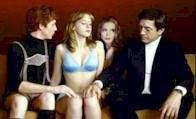 |
Water Drops on Burning Rocks
[Gouttes D'eau Sur Pierres
Brûlantes]
(1999, 90 min, France, François Ozon)
François Ozon adapted and directed this screenplay based upon a play by Rainier Werner
Fassbinder. He does it wonderfully, retaining Fassbinder's strange look at characters who you want to hate and sympathize at the same time. Léopold (Bernard
Giraudeau) is fiftyish and experienced in life. He tends to be able to seduce any man or woman, including the sexy Franz
(Malick Zidi), a very naïve 20-year-old. Franz is about to get married to Anna
(Ludivine Sagnier) but ends up falling in love with Leopold. Also seduced by Leopold is Véra (Anna Levine), a mysterious woman who seems to be coming back from the past.
Source : Obtained from QueerCinema.Com
Water Drops on Burning Rocks
(1999, France)
Director: Francois Ozon
Starring: Bernard Giraudeau ; Malik Zidi ; Ludivine Sagnier
When Rainer Werner Fassbinder was 19, he wrote a play with four characters: Leopold (Bernard Giraudeau), an older gay man past his prime; Franz (Malik Zidi), an innocent 20-year-old he brings home one night; Anna (Ludivine Sagnier), Franz's lovely, highly emotional fiancee; and Vera (Anna Thomson), an ex-love of Leopold's, who had a sex operation to keep him interested in her. It didn't work, at least not for long.
Francois Ozon, 32, the youthful director who's been compared to both Hitchcock and Chabrol by many a critic, has now adapted this work, and the result is a campy drawing room comedy full of powerplays, dancing, singing, and tears. It won a Teddy Award at this year's Berlin International Film Festival as Best Gay Feature of the Year, and you can see why.
What first comes off as a simple satire brimming with an almost John Waters-esque absurdity can bear far deeper scrutiny and still not come up empty. It's in fact an incisive study of homosexuality during that still basically closeted era.
Franz instantly falls in love with Leopold, giving up any claim to his former heterosexuality. He in fact adopts the poses of a seventies' long-suffering housewife, one depressed about how she's been transformed into a maid from a sex object. Then when Anna and Vera show up on the scene, the real emotional battles begin.
One aspect of the film, though, will bypass many folks. It did me until I heard Ozon interviewed on a New York radio show. It appears Fassbinder had made Leopold a Jew. Ozon didn't know why supposedly until after he completed the film; this Leopold was a survivor of a concentration camp. Now in his little apartment, he is creating his own camp where he is the commander. Whether that holds water is probably best commented on by film deconstructionists.
I prefer the lighter, uniformed, and decidedly more delightful and shallow view of the project. You will, too.
--Brandon Judell
Source : Obtained from
PlanetOut.Com
|

